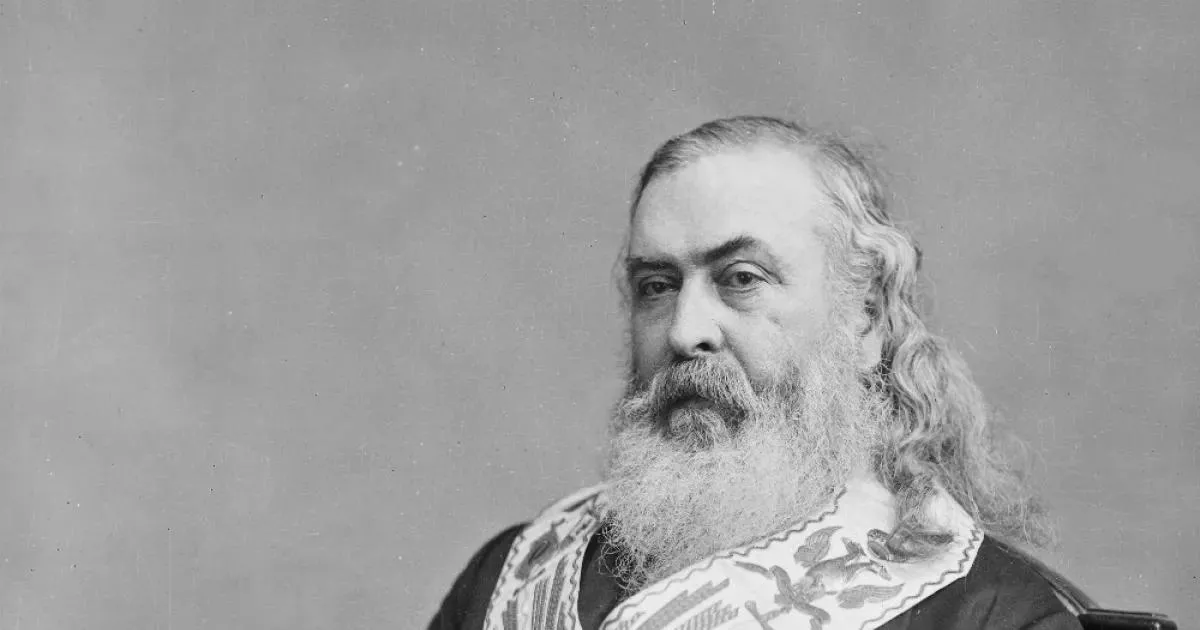Albert Pike was a man of many talents and roles. He was an American author, poet, orator, editor, lawyer, and jurist. He served as an associate justice of the Arkansas Supreme Court and a senior officer in the Confederate States Army. Pike is also known for his prominent role in the Freemasons, serving as the Sovereign Grand Commander of the Supreme Council, Scottish Rite.
1900: Gen. Albert Pike's Poems Published
Albert Pike's poems were republished in a collection titled "Gen. Albert Pike's Poems" in 1900, after his death.
1901: Pike Memorial Erected
A memorial dedicated to Albert Pike was erected in Washington, D.C.'s Judiciary Square neighborhood in 1901.
1905: Pike Identified as Klan Official
Walter Lynwood Fleming's book "Ku Klux Klan: Its Origin, Growth and Disbandment," published in 1905, identified Albert Pike as a high-ranking official within the Ku Klux Klan.
1915: Albert Pike Klan Established
An Illinois chapter of the revived Ku Klux Klan, named the "Albert Pike Klan," was established in 1915.
1915: Ku Klux Klan Revived
The Ku Klux Klan experienced a revival in 1915.
1916: Lyrics and Love Songs Published
In 1916, another collection of Albert Pike's poetry, "Lyrics and Love Songs," was published posthumously.
1924: Authentic History: Ku Klux Klan, 1865–1877 Published
Susan Lawrence Davis's book, "Authentic History: Ku Klux Klan, 1865–1877," published in 1924, claimed that Albert Pike held key positions in the Ku Klux Klan, including "Chief Judicial Officer."
1939: Invisible Empire: The Story of the Ku Klux Klan, 1866–1871 Published
Stanley Horn's book, "Invisible Empire: The Story of the Ku Klux Klan, 1866–1871," published in 1939, also asserted that Albert Pike was a leader within the Ku Klux Klan in Arkansas.
1944: Remains Moved to the House of the Temple
Albert Pike's remains were relocated to the House of the Temple, the headquarters of the Southern Jurisdiction of the Scottish Rite, in 1944.
1971: Doubts Cast on Pike's KKK Membership
Allen W. Trelease's book, "White Terror: The Ku Klux Klan Conspiracy and Southern Reconstruction," published in 1971, questioned Albert Pike's alleged membership in the Ku Klux Klan, citing a lack of evidence in the Klan's constitution.
1997: Pike Biography Disputes Klan Affiliation
Walter Lee Brown's biography of Albert Pike, published in 1997, disputed claims of Pike's Ku Klux Klan membership, relying on Trelease's work and dismissing previous accounts as unreliable.
2019: Calls for Statue Removal
In 2019, Delegate Eleanor Holmes Norton advocated for the removal of the Albert Pike statue in Washington, D.C.
June 19, 2020: Pike Statue Torn Down
Amidst the George Floyd protests, a statue of Albert Pike in Washington, D.C., was torn down and set on fire on June 19, 2020, due to his ties to the Confederacy and alleged involvement with the Ku Klux Klan.
Mentioned in this timeline

Washington D C is the capital city and federal district...

Books are a means of storing information as text or...
Illinois is a Midwestern U S state bordering Lake Michigan...

An empire is a political structure consisting of a dominant...

Fire is a rapid oxidation process called combustion releasing heat...

A constitution serves as the foundational legal document for any...
Trending

3 months ago Al Horford's Game Schedule Determined; Resting Against Grizzlies, Playing Clippers Tomorrow

Caleb Love is an American professional basketball player currently playing for the Portland Trail Blazers of the NBA on a...

2 months ago Lakers Defeat Trail Blazers 123-115, Smith shines as unexpected hero alongside Hachimura.
Shaedon Sharpe is a Canadian professional basketball player currently playing for the Portland Trail Blazers in the NBA He was...

1 month ago Jalen Johnson Achieves Historic Triple-Double, Fastest in Hawks History

5 months ago NBA and NBPA support betting limitations; is Michael Porter Jr. a problem?
Popular

Carson Beck is an American college football quarterback currently playing...
Curt Cignetti is an American college football coach currently the...

XXXTentacion born Jahseh Dwayne Ricardo Onfroy was a controversial yet...
WWE Raw a professional wrestling television program by WWE airs...

Stranger Things created by the Duffer Brothers is a popular...

Kristi Noem is an American politician who has served as...
